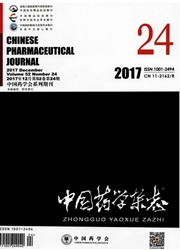

 中文摘要:
中文摘要:
目的研究人参皂苷对β-淀粉样肽(Aβ)诱导THP—1单核细胞培养上清液致SK—N—SH神经细胞损伤模型的影响及其作用机制。方法用乳酸脱氢酶(LDH)漏出率观察SK—N—SH细胞的损伤程度.用放射免疫法测定THP—1单核细胞培养上清液中炎性细胞因子IL—1β,IL-8和TNFα的表度。结果人参皂苷与THP-1单核细胞预孵育30min,再用Aβ1-40(125nmol·L^-1)与THP-1细胞孵育2h,离心取上清液加入到SK—N—Sll神经细胞培养中孵育24h结果显示,GS(100和200mg·L^-1)可明显减少LDH从神经细胞漏出、减轻细胞膜损伤;人参皂苷(50,100和200mg·L^-1)显著减少THP—1单核细胞培养上清液中细胞炎性细胞因子IL—1β,IL-8和TNFα的含量、结论人参皂苷可以通过抑制炎性细胞因子的表达而减少对神经元的损伤,因此对于AD的防治具有潜在的应用价值.
 英文摘要:
英文摘要:
OBJECTIVE To investigate the effect and mechanism of ginsenoside on nerve cell damage model caused by the supernatant of THP-1 monocytes induced by ,8-amyloid (Aβ). METHODS The cellular impairment was determined by LDH leakage from human neuroblastoma cell line SK-N-SH cells. The concentrations of i~fflammato~- cytokine IL-1β, IL-8 and TNFα were measured by radioimmunoassay (RIA) in the supernatant of THP-1 monocvtes. RESULTS THP-1 monocytes were preincubated with ginsenoside for 30 rain, then incubated with Aβ1-40 ( 125 nmol · L^-1) for 2 h; after centrifuge, their supernatant was added to SK-N-SH cell culture and incubated for 24 h. The results showed that GS ( 100 and 200 mg· L^-1 ) significantly decreased LDH leakage from SK-N-SH nerve cells, ginsenoside(50, 100 and 200 mg · L^-1 ) obviously reduced the contents of inflammatory, cytoklne IL-1β, IL-8 and TNFα in the supernatant of THP-1 monocytes. CONCLUSION Ginsenoside can protect nerve cells from damage by inhibiting the expression of infflammatory cytokines in monocytes induced by Aβ, thus may have the potential for treating Alzheimer disease.
 同期刊论文项目
同期刊论文项目
 同项目期刊论文
同项目期刊论文
 期刊信息
期刊信息
